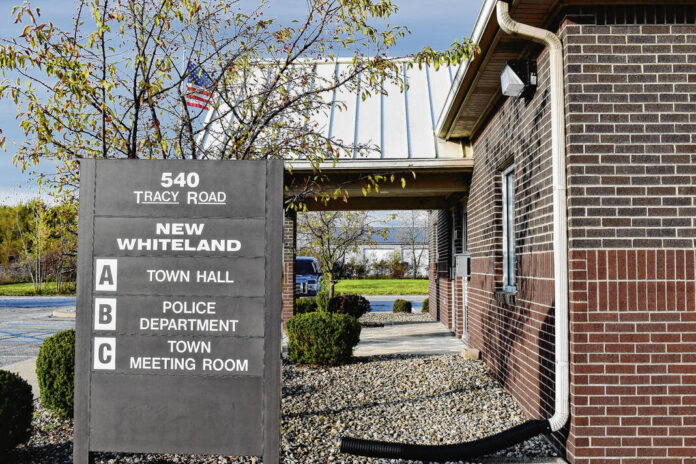Turnover in New Whiteland’s police department is a problem, and town council members want to find a way to fix it.
Like police departments across the county, and nationwide, the New Whiteland Police Department is struggling with retention and recruitment.
In a period of six months, the department lost three officers to the Whiteland Police Department, said John Perrin, New Whiteland Town Council president. Not long before that, two other officers also left, with one leaving for the Greenwood Police Department.
Perrin brought this up to the town council last week to start thinking of ways to retain officers.
“We are currently hemorrhaging police officers,” Perrin said.
One issue brought up was pay. Starting pay for a new police officer in New Whiteland is around $55,000, and that is bumped up to $60,000 once an officer completes the academy. By comparison, Whiteland now starts officers at $65,400, after it increased police pay by 5% this year.
Besides Whiteland though, other comparable town police departments in the county, including Edinburgh and Trafalgar, start officers at less than New Whiteland, even after raising pay in 2023. Lower-ranked officers at Edinburgh make between $40,000 and $48,000, according to 2022 salary data. Trafalgar’s lowest-ranking officer’s salary is now $50,000, after the town approved $5,000 raises for the entire department.
Perrin asked Chief Joe Rynerson to pull together salaries in other towns of comparable size elsewhere, such as Angola, Ellettsville and McCordsville, and many of them were the same or lower than New Whiteland.
However, council member John Schilawski pointed out that many of those comparable smaller towns are more isolated and rural. They do not have the competition New Whiteland has with other, larger nearby departments like Greenwood, Franklin, the Johnson County Sheriff’s Office and even the Indianapolis Metropolitan Police Department.
Rynerson agreed that competition is tough with other departments in the county, who are also seeking to hire new officers and dealing with retention issues. Though not necessarily of comparable size, the bigger police departments are competitors, Rynerson said.
Nearly every police department in the county, including Franklin, Greenwood and the sheriff’s office, also gave between 5 and 7% raises this year because of the hiring troubles.
“I’m dealing with a lot of Johnson County agencies basically that we’re trying to keep up with,” Rynerson said. “…And it seems like every time we get a substantial raise, another agency also does that.”
New Whiteland has hired two officers to fill those vacant spots, and is now interviewing for the third. With that, the other problem Rynerson is facing is the lack of applications, which most police departments deal with now, he said.
That makes a high turnover even more difficult, Rynerson.
“When I lose an officer, it’s hard enough losing one, let alone trying to get more to come to a smaller department. It really compounds heavily for me,” he said.
New Whiteland police is funded for eight full-time officers. The most senior police officer below Rynerson has only been at the department now for around two years.
Perrin said he is tired of New Whiteland now seemly being treated like a “stepping stone” for officers to move on to other departments.
It can be costly too, as it costs over $2,000 for a new hire to equip them with a vest and other needed attire, Rynerson said.
Pay isn’t the only way police departments are competing. Perks and benefits are also a factor.
Rynerson and the council discussed ways they could potentially give perks or agreements to retain officers for longer, besides a higher salary.
Rynerson suggested perks such as a clothing allowance or a health savings account, which many nearby departments, including Whiteland, have, he said. Bonuses were also discussed because IMPD, for example, offers a $10,000 bonus for new hires.
Council members tossed around the idea of potentially offering a bonus over a period of five years or so. They also talked about having officers sign an agreement that if they left before a certain number of years, they would owe the town the expenses paid for hiring them.
Many of these ideas were abstract and not concrete. Perrin said he just wanted to bring up the topic to start thinking about actions the town could take to help.
The council asked Rynerson to come up with a list of potential perks or changes that could be made to increase retention and recruitment.





